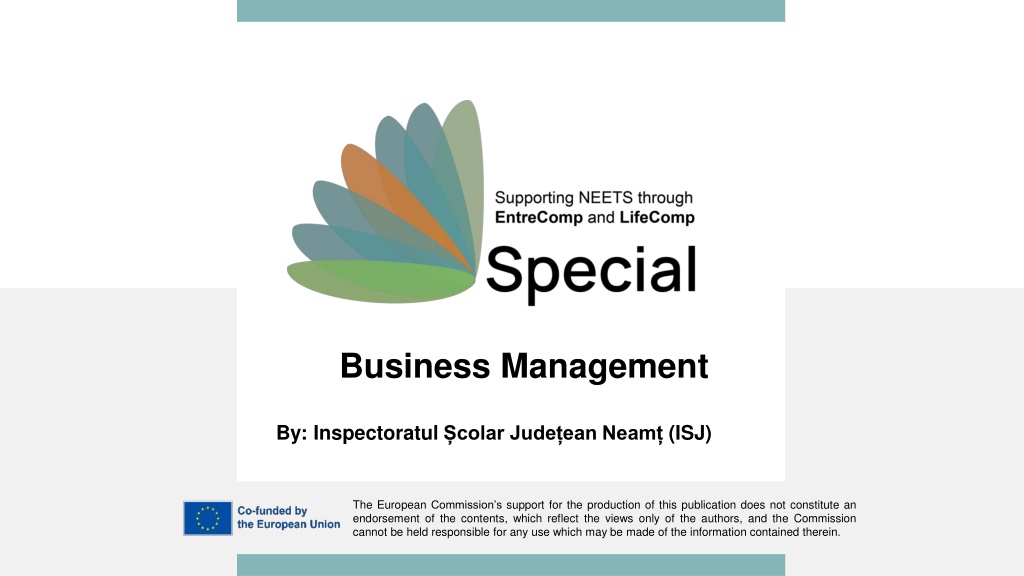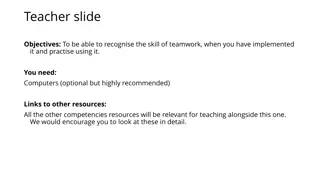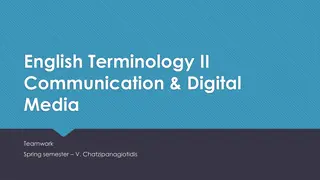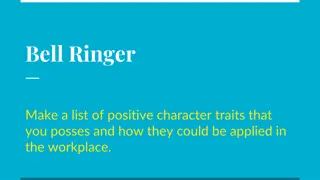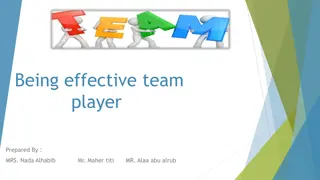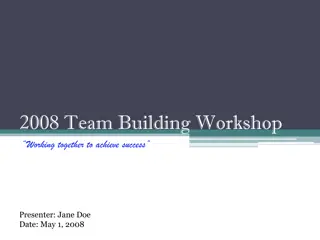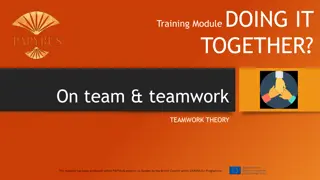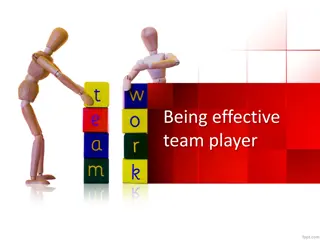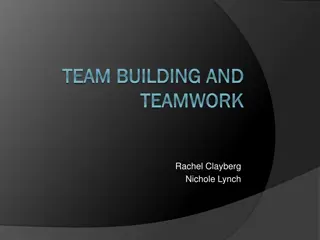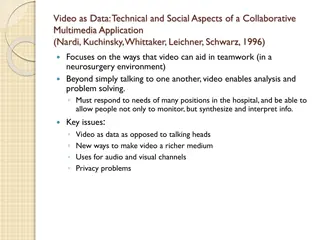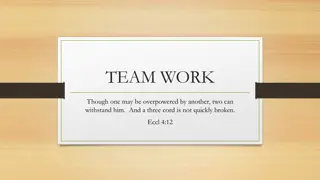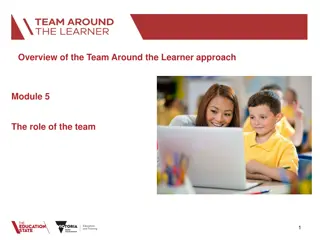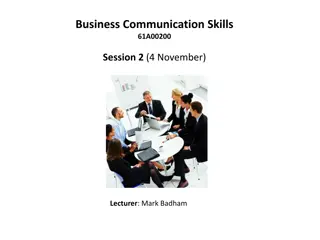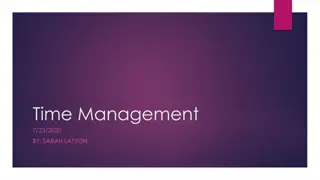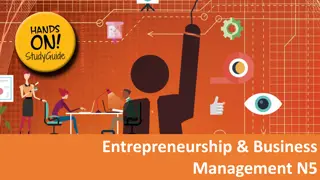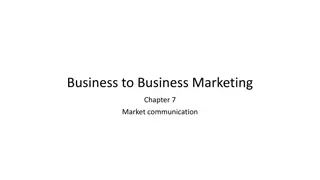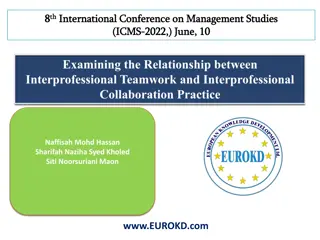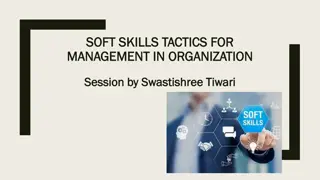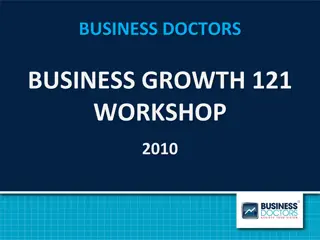Insights into Effective Business Management and Teamwork
The publication delves into the realm of business management and teamwork, discussing definitions, benefits, and examples. It emphasizes the significance of collaboration in achieving goals, fostering creativity, and enhancing productivity within organizations. The European Commission's support for the content does not signify endorsement but rather aims to encourage dialogue on these crucial topics.
Download Presentation

Please find below an Image/Link to download the presentation.
The content on the website is provided AS IS for your information and personal use only. It may not be sold, licensed, or shared on other websites without obtaining consent from the author. Download presentation by click this link. If you encounter any issues during the download, it is possible that the publisher has removed the file from their server.
E N D
Presentation Transcript
Business Management By: Inspectoratul colar Jude ean Neam (ISJ) The European Commission s support for the production of this publication does not constitute an endorsement of the contents, which reflect the views only of the authors, and the Commission cannot be held responsible for any use which may be made of the information contained therein. The European Commission's support for the production of this publication does not constitute an endors ement of the contents, which reflect the views only of the authors, and the Commission cannot be held responsible for any use which may be made of the information contained therein.
Index 01 Business management in terms of effective teamwork Definitions, benefits, ways of encouraging the team spirit 02 Intercultural management the key to successful employability on the European labour market Cultural diversity, advantages and obstacles 03 A profitable business in the digital era Steps to follow, businesses in high demand The European Commission's support for the production of this publication does not constitute an endors ement of the contents, which reflect the views only of the authors, and the Commission cannot be held responsible for any use which may be made of the information contained therein.
1. Business management in terms of effective teamwork Section 1.1: Definitions To define them as simply as possible, business management means the act of managing (coordinating and administrating) business activities, tasks, and resources in order to achieve a set objective whereas teamwork is seen as a process in which a group of people work together for the purpose of achieving a goal. Both terms have a strong bond, they complete each other and only combined can one have the best results. The European Commission's support for the production of this publication does not constitute an endors ement of the contents, which reflect the views only of the authors, and the Commission cannot be held responsible for any use which may be made of the information contained therein.
1. Business management in terms of effective teamwork Section 1.2: Benefits and examples of teamwork When conducting a job interview today, teamwork competency is one of the most valued by recruiters in employee selection process as it brings many benefits to the company. Let us take a look at some advantages of teamwork which can be applied both in the company environment and in sports teams, and even in educational contexts where several people are involved in joint projects: 1. It promotes creativity and learning. Creativity grows when people work together as a team. Brainstorming avoids self-centered viewpoints and allows creativity to expand thanks to the viewpoints of the teammates. The European Commission's support for the production of this publication does not constitute an endors ement of the contents, which reflect the views only of the authors, and the Commission cannot be held responsible for any use which may be made of the information contained therein.
1. Business management in terms of effective teamwork 2. It mixes complementary strengths. Teamwork allows the talents of each member in the team to complement each other to create a final product that could not have been achieved individually. Just like in a musical group, where one person may stand out for having a good voice, another for playing the guitar very well, and another for being very good at the drums. In a work team, one can stand out because he/she is a good programmer, another because he is a good graphic designer, and another because he knows a lot about the textile business. The union of the three can provide new business opportunities that would not be possible if they wanted to go it alone. 3. It reduces stress. Individual work increases workload and responsibilities and this can lead to increased stress. Because teamwork allows both tasks and responsibilities to be shared, stress is reduced. The European Commission's support for the production of this publication does not constitute an endors ement of the contents, which reflect the views only of the authors, and the Commission cannot be held responsible for any use which may be made of the information contained therein.
1. Business management in terms of effective teamwork 4. It improves performance. As teamwork allows individuals to focus on what they do best, they don t have to worry about jobs or tasks they do not master. This helps produce better quality work as it increases productivity. 5. It increases efficiency and productivity. Each individual focuses on their specialty, and collaboration allows each to maximize their potential in the task they master. Before achieving results, teamwork requires a period in which relationships can develop so as groups continue to increase efficiency and productivity. The European Commission's support for the production of this publication does not constitute an endors ement of the contents, which reflect the views only of the authors, and the Commission cannot be held responsible for any use which may be made of the information contained therein.
1. Business management in terms of effective teamwork Section 1.3: Ways of encouraging the team spirit To form a team is just the beginning, to stick together is progress, to work together is success. Henry David Thoreau To maintain a cohesive team and achieve long-term results is the goal of any efficient manager who must demonstrate emotional intelligence, empathy, and compassion. And, last but not least, he/she must lead by example and demonstrate that he is also part of the team, while maintaining his/her objectivity. In order to have a prosperous business any leader must encourage team spirit: 1. through common objectives 2. by creating a sense of belonging to the group and the organization 3. by clearly delegating tasks 4. by organizing professional and social activities recurring meetings, team-buildings, workshops, team volunteering actions 5. by recognizing each member as a unique individual with different experiences, knowledge and points of view, and encouraging creativity and innovation. The European Commission's support for the production of this publication does not constitute an endors ement of the contents, which reflect the views only of the authors, and the Commission cannot be held responsible for any use which may be made of the information contained therein.
2. Intercultural management the key to successful employability on the European labour market Section 2.1: Cultural diversity can turn any business into profit The notion of intercultural management involves the analysis and implementation of strategies aimed at managing the cultural differences inherent in intercultural teams. By cultural differences we must understand the representations and values which characterize each culture. For the effective management of cultural diversity, those aspects of culture which influence the way people work and relate to each other must be taken into account. Furthermore, work ethics can be studied in any type of organization, regardless of its size. Culture influences: our behavior, our perceptions, our values. Let us take an example of a French manager within an English team: A French manager leading an English team may be confronted with different cultural situations from those he might encounter with a French team. This cultural difference can be difficult to manage because the behaviours, norms and values of another culture are often unknown to us and we do not know how to interpret them. The European Commission's support for the production of this publication does not constitute an endors ement of the contents, which reflect the views only of the authors, and the Commission cannot be held responsible for any use which may be made of the information contained therein.
2. Intercultural management the key to successful employability on the European labour market To go deeper into the matter, culture influences our behaviour, perceptions and values, and also shapes our work habits. Thus, the French manager risks being somewhat disconcerted by the informal relations that his English collaborators have with each other. Indeed, it is very common for the English to call each other by their first name, and this happens at all levels of the organization chart. This way of contact in the professional environment is still quite rare in France where the use of civilities - Mister, Madam - and titles - Master, Doctor- remains very anchored in the business culture and implies a mark of respect towards colleagues and hierarchical superiors. The European Commission's support for the production of this publication does not constitute an endors ement of the contents, which reflect the views only of the authors, and the Commission cannot be held responsible for any use which may be made of the information contained therein.
2. Intercultural management the key to successful employability on the European labour market It is very common for the English to call each other by their first name, and this, at all levels of the organization chart. Fortunately, a solution exists: Training in intercultural management is designed to respond to this type of problem. They make it possible to become aware of one's own cultural values for better management of intercultural teams. This awareness of the culture of the other and of one's own culture brings people together and strengthens professional ties by reducing misunderstandings and cultural incidents that can affect the smooth running of a project. More than that, training in intercultural management brings real added value and profit to the company for which cultural differences will be understood and assimilated within their intercultural teams. The European Commission's support for the production of this publication does not constitute an endors ement of the contents, which reflect the views only of the authors, and the Commission cannot be held responsible for any use which may be made of the information contained therein.
2. Intercultural management the key to successful employability on the European labour market Section 2.2:Advantages and obstacles in intercultural management Intercultural management is viewed as an asset, but also as a great challenge for a multinational company. Understanding the advantages and obstacles is the first step in implementing good managerial practices. Thus, the collaboration and richness of a multicultural team can offer your company: * diverse perspectives, which are sources of creativity and innovation; * a better understanding of your customers, which will support the competitiveness of your organization; * increased cultural sensitivity and therefore better targeted marketing; * the ability to better retain talent within your company; * the possibility of developing a wider and more adaptable range of products and services. In order to avoid the obstacles which may appear in an intercultural team the one should pay attention to some rules. Let us follow some tips to avoid obstacles in a multicultural business team: The European Commission's support for the production of this publication does not constitute an endors ement of the contents, which reflect the views only of the authors, and the Commission cannot be held responsible for any use which may be made of the information contained therein.
2. Intercultural management the key to successful employability on the European labour market 1. Do not ignore cultural differences within your team The simple act of learning about the culture of your team members can help you identify differences (especially in the way you communicate) that could be a source of stigma. 2. Set up a multicultural management allowing your team to take advantage of their differences It is important to plan times for preparation when your employees need it. It also shows them that you respect their differences. This behaviour will give them the feeling of being truly valued by their manager, as well as by the other members of their team. 3. Actively fight stereotypes There is often a finer line than one might imagine between being aware of cultural differences and relying on stereotypes to make assumptions about the behaviour of your employees. To avoid them, it is usually enough to familiarize yourself with each of your collaborators. Encourage your colleagues to do the same. This will allow you to no longer see them as the representatives of a culture, but as individuals in their own right. The European Commission's support for the production of this publication does not constitute an endors ement of the contents, which reflect the views only of the authors, and the Commission cannot be held responsible for any use which may be made of the information contained therein.
2. Intercultural management the key to successful employability on the European labour market 4. Practice empathetic management The simple fact of worrying about the well-being of your employees and their integration within your team, allows you both to defuse blockages when they arise (and this, whether they are due to cultural differences or not) and to promote mutual respect among your employees. 5. Get inspired by the intercultural management practices of other companies Many concrete initiatives can allow you to value the cultural differences within your team, promote good understanding and collaboration. Some good advice is to look for companies which have already experimented with intercultural management and adapt the ideas to your own company. The European Commission's support for the production of this publication does not constitute an endors ement of the contents, which reflect the views only of the authors, and the Commission cannot be held responsible for any use which may be made of the information contained therein.
3. A profitable business in the digital era Section 3.1: Steps to follow in order to start a profitable e-business Starting any business, online one included, is not as simple as it may seem at first sight. However, when you are determined to enter the market, some steps are mandatory to be taken into account. Here are some ideas you may follow to launch your business on the internet: 1. Sell your creations online In order to achieve this step, it is necessary to lay down a few basics: the tools you need (computer, website host, a domain name), questions to ask yourself before getting started (Is the project really interesting for me?, Are my skills appropriate and/or sufficient?, Are my resources sufficient? etc.), the process to create your business (to ensure an e-commerce respectful of legislation, it is mandatory to create your company to sell your creations online.), actions to make yourself known (to hope to make your e-commerce store profitable to sell your own products, you have to go through the webmarketing box). The European Commission's support for the production of this publication does not constitute an endors ement of the contents, which reflect the views only of the authors, and the Commission cannot be held responsible for any use which may be made of the information contained therein.
3. A profitable business in the digital era 2. Create a drop-shipping store The principle of what is called drop-shipping is to sell a product without taking care of stock management. Very profitable, this type of online business does not require a lot of investment since it is enough to open a web platform to sell the articles put forward. 3. Launch your brand It is important to establish a strategy to stand out and thus create a brand that speaks to potential future buyers: create your style and target your customers, focus on quality, build customer loyalty. 4. Become a freelancer There are many jobs which allow you to work as a freelancer, that is to say a micro-entrepreneur. By engaging in this project, you then become your own boss, arrange your schedules as you wish, establish your own professional framework and, above all, give yourself every chance to make your project a successful business. 5. Start blogging Big trend of the moment, blogs are flourishing on the internet and are proving to be the ideal plan for certain profiles. Thus, create a website, define your target, find the right keywords and build customer loyalty. 6. Publish your e-book The publication of an e-book can be very profitable in the long run and may take you one step ahead your competitors on the e-market. The European Commission's support for the production of this publication does not constitute an endors ement of the contents, which reflect the views only of the authors, and the Commission cannot be held responsible for any use which may be made of the information contained therein.
3. A profitable business in the digital era Section 3.2: Businesses in high demand There are quite many opportunities to start an e-business which can turn into a profitable and long-term activity. Here are some ideas of such jobs which can be performed from the cosiness of your home: 1. Start a blog Thousands or even hundreds of thousands of people around the world create quality content on a variety of topics every day, generating substantial income. 2. Graphic design All you need is a computer powerful enough to run the featured software, some imagination and motivation. Graphic design professionals are very well paid and can work from the privacy of their own home. 3. Web design People who work in web design are incredibly valuable to all companies that own websites, regardless of the company's field of activity. The European Commission's support for the production of this publication does not constitute an endors ement of the contents, which reflect the views only of the authors, and the Commission cannot be held responsible for any use which may be made of the information contained therein.
3. A profitable business in the digital era 4. Online courses If you have got enough experience in a field that is somewhat interesting and you have useful knowledge to share with others, then online courses are a good solution for your business. 5. Instagram marketing An individual with experience in Instagram marketing can be the basis of a very profitable modern business idea. 6. Resale of products in online stores Anyone can sell products on various sites. You just need to find factories, either local or international, that create items which are not that popular, but which you think would be a real hit once they get on the market. The European Commission's support for the production of this publication does not constitute an endors ement of the contents, which reflect the views only of the authors, and the Commission cannot be held responsible for any use which may be made of the information contained therein.
3. A profitable business in the digital era 7. Virtual assistant Many important people, who do not want to hire an assistant manager, turn to such business ideas to find people willing to help them in their daily life. A virtual assistant will have quite different duties from booking plane tickets, to managing emails, documents and so on. 8. Resume Writer Such online business ideas deal with the creation and writing of CVs for individuals, for some money, of course. The European Commission's support for the production of this publication does not constitute an endors ement of the contents, which reflect the views only of the authors, and the Commission cannot be held responsible for any use which may be made of the information contained therein.
5 glossary entries Intercultural management. It means understanding and managing the effects of cultural influence on organization, team, and business to optimize organizational performance. Its purpose is to create an environment where there is awareness and respect for each culture. Stereotypes. They are often unfair and untrue beliefs which many people have about all people or things with a par ticular characteristic. Website. A website is composed of all the web pages of the same domain stored on a server. Colloquially, the term s website and web page are used interchangeably, although they are not exactly the same. Drop-shipping store. It is a store that ships goods from a manufacturer or wholesaler directly to a customer instea d of to the retailer who took the order. Blog. Shortened from weblog, a blog is a frequently updated website that is used for personal commentary or busin ess content. It can take the form of posts or articles and usually has specific topics, such as sport, travel, entertain ment, food, IT, etc. The European Commission's support for the production of this publication does not constitute an endors ement of the contents, which reflect the views only of the authors, and the Commission cannot be held responsible for any use which may be made of the information contained therein.
Bibliography and further references Bryant, A. Key Elements of Effective Workplaces: https://www.youtube.com/watch?v=R78pvt9JFNY Gordon, J. (2018). The Power of a positive team: Proven principles and Practices that Make Great Teams Great: https://www.amazon.com/Power-Positive-Team-Principles-Practices/dp/1119430240 https://www.octanner.com Mead, R. and Andrews, T.G. (2009). International Management: Culture and Beyond, Fourth Edition Rogers, M.G. (2017). You Are the Team: 6 Simple Ways Teammates Can Go from Good to Great. https://www.amazon.com/You-Are-Team-Simple-Teammates/dp/1546770852 Spencer-Oatey, H. & Franklin, P. (2009). Intercultural Interaction: A Multidisciplinary Approach to Intercultural Communication The European Commission's support for the production of this publication does not constitute an endors ement of the contents, which reflect the views only of the authors, and the Commission cannot be held responsible for any use which may be made of the information contained therein.
Quests Based on what you have studied in this unit, can you solve the exercises in the following slides? You will have to make decisions about challenging situations in which you will use the knowledge you have acquired. Take decisions Expand your thinking You will have to open your mind and think as if you were really in that situation, using your best tool: your brain. The European Commission's support for the production of this publication does not constitute an endors ement of the contents, which reflect the views only of the authors, and the Commission cannot be held responsible for any use which may be made of the information contained therein.
Quest 1: Team work skills can turn you into a successful employee Introduction: What s this all about? Let s talk about teamwork and its role in making any individual a successful candidate on the labour market! Nowadays employers seek people which have the competency to efficiently work together in order to achieve the tasks of the company. The employee of the future needs this skill not only to become part of the team but also to get to higher professional levels. Among the many advantages teamwork has we can mention: -it promotes creativity and learning -it mixes complementary strengths -it reduces stress -it improves performance -it increases efficiency and productivity The European Commission's support for the production of this publication does not constitute an endors ement of the contents, which reflect the views only of the authors, and the Commission cannot be held responsible for any use which may be made of the information contained therein.
Quest 1: Team work skills can turn you into a successful employee Task: What s the activity? On this occasion there will be a plenary activity, commonly known as icebreaking. You will have to split each other into pairs and I will hand each pair a piece of paper. Each pair is responsible for finding a 10 things they have in common with one another (remember: easy cop-outs are not allowed, such as we both have legs ). After 5 minutes every two pairs join together and try to find from the two lists as many things in common. After another 10 minutes the 4 people join another group of four and write down at least one thing in common for all the 8 people, the time allowed being 12-15 minutes. This technique is quite usual before starting to work together as it promotes team bonding being very useful for the success of the team management. The European Commission's support for the production of this publication does not constitute an endors ement of the contents, which reflect the views only of the authors, and the Commission cannot be held responsible for any use which may be made of the information contained therein.
Quest 1: Team work skills can turn you into a successful employee Process: What am I going to do? Now that you introduced yourselves and discovered common points it is time to perform a task together. You will work in groups of six and starting from the image provided in the Task section you will discuss about the meanings of the 3 words written in bold in the crossword and their relevance to create a successful team. It is also useful to use the materials in the Resource section. Choose a group leader who will speak for you. The European Commission's support for the production of this publication does not constitute an endors ement of the contents, which reflect the views only of the authors, and the Commission cannot be held responsible for any use which may be made of the information contained therein.
Quest 1: Team work skills can turn you into a successful employee Learning outcomes: What will I learn? Knowledge Acquired You will be aware of the characteristics of a successful team. You will learn how to face challenges in a team. You will develop your communication skills, the foundation of any successful teamwork. Skills Acquired You will improve your creativity and openness to suggestions, your self-awareness skills. You will gain a willingness to share expertise and trust your team mates. Attitude Acquired You will be confident in working as part of a team successfully. You will constantly identify good opportunities on the labour market. The European Commission's support for the production of this publication does not constitute an endors ement of the contents, which reflect the views only of the authors, and the Commission cannot be held responsible for any use which may be made of the information contained therein.
Quest 1: Team work skills can turn you into a successful employee Conclusion: What will I take home? What is your impression about teamworking now after you have made the first steps into this challenging world? If you have found it quite difficult before, the activities performed together with your group mates definitely enlightened you and provided you with more courage. And this is not all, just stay focused because this is only the beginning! You have seen how important it is to know each of your team members, to socialize with them and to find common characteristics so as to be aware of what strategies the team may use to complete the task successfully. Last but not least we recommend you to consider the Resources section of this task where you can enlarge your knowledge about the topic. The European Commission's support for the production of this publication does not constitute an endors ement of the contents, which reflect the views only of the authors, and the Commission cannot be held responsible for any use which may be made of the information contained therein.
Quest 2: Embracing cultural diversity at work Introduction: What s this all about? Let's face it, business today is on a global stage. As you yourselves see every day, technology is just one of the factors making our world smaller and giving companies of all sizes the freedom to hire the best people, wherever they are. Everyone talks about "cultural diversity". For an actual definition, let s see the Oxford dictionary: "the existence of a variety of cultural or ethnic groups within a society". In other words, it is a population where all the differences are represented. For business, the types of diversity in the workplace include "origin, age, ability, language, nationality, socio-economic status, gender, preferences". When we speak of employee diversity, we refer to the "result of the practices, values, traditions or beliefs of employees based on origin, age, or gender". In your daily life you may have surely met or heard of at least one person coming from a different cultural background which happened to be your class/school mate or maybe you had the chance to work together for some specific purpose. That is why the knowledge you will get from this course will definitely be an advantage whenever you find yourself working with intercultural mates. The European Commission's support for the production of this publication does not constitute an endors ement of the contents, which reflect the views only of the authors, and the Commission cannot be held responsible for any use which may be made of the information contained therein.
Quest 2: Embracing cultural diversity at work Task: What s the activity? In this activity you will have to imagine you have just been hired in a multicultural team and would like to integrate. Identify the things you have in common with the members of the team, try to adjust and fit with the others. Use your knowledge you have learnt in this training course so far in order to successfully complete your task. The European Commission's support for the production of this publication does not constitute an endors ement of the contents, which reflect the views only of the authors, and the Commission cannot be held responsible for any use which may be made of the information contained therein.
Quest 2: Embracing cultural diversity at work Process: What am I going to do? Develop a strategy to put your plan into action paying attention not to offend any of your team mates. Think about all the knowledge you have acquired so far and also take into consideration the materials in the Resources section. An essential thing to keep in mind is the language barrier. The most popular language in multicultural teams is of course English, the international language of business, but even if you have a good command of English, it is sometimes necessary to adapt to "local" English, practiced in the company. It is also important to get to know the culture in which you work, and the codes (of communication, etiquette, etc.) associated with it. The European Commission's support for the production of this publication does not constitute an endors ement of the contents, which reflect the views only of the authors, and the Commission cannot be held responsible for any use which may be made of the information contained therein.
Quest 2: Embracing cultural diversity at work Learning outcomes: What will I learn? Knowledge Acquired You will learn the characteristics of a multinational team. You will be able to face challenges while working in an international company You will learn how to make use of cultural intelligence. Skills Acquired You will improve your communication skills. You will be able to spot opportunities on the labour market. You will develop creative and purposeful ideas. Attitude Acquired You will empower your team working spirit. You will easily identify multicultural diversity. You will be confident in working with team mates from all over the world. The European Commission's support for the production of this publication does not constitute an endors ement of the contents, which reflect the views only of the authors, and the Commission cannot be held responsible for any use which may be made of the information contained therein.
Quest 2: Embracing cultural diversity at work Conclusion: What will I take home? Being part of a multinational team can be really challenging but with specific knowledge and practice everything will turn into a great professional experience. You have seen till now that when working in a multicultural team, it is essential to listen to the culture or cultures present, and to analyze the different codes that result from it. This is called developing cultural intelligence. Diversity and inclusion in the workplace allow companies to build teams that bring different perspectives and talents, which increases innovation and generates higher revenue. The European Commission's support for the production of this publication does not constitute an endors ement of the contents, which reflect the views only of the authors, and the Commission cannot be held responsible for any use which may be made of the information contained therein.
Quest 3: Profitable businesses in demand in the online environment Introduction: What s this all about? The pandemic highlighted several changes in work and a great deal of them are related to performing various jobs in the online environment. One of the advantages of this job is that you can work from home most of the time and more than that, especially sales activities which do not need the management of large inventories of products can even be managed from anywhere without the need to systematically stay at home. However, you must take into consideration the fact that working from home, full-time or part-time, means that where you live will also become the nerve center of your business. The European Commission's support for the production of this publication does not constitute an endors ement of the contents, which reflect the views only of the authors, and the Commission cannot be held responsible for any use which may be made of the information contained therein.
Quest 3: Profitable businesses in demand in the online environment Task: What s the activity? In this quest you will be challenged to find an e-business which seems suitable to your skills and qualifications and try to put it into practice. Keep in mind to choose something which is in demand and make a plan that will help you be successful! The European Commission's support for the production of this publication does not constitute an endors ement of the contents, which reflect the views only of the authors, and the Commission cannot be held responsible for any use which may be made of the information contained therein.
Quest 3: Profitable businesses in demand in the online environment Process: What am I going to do? In this activity you will work in groups of 4 people. Imagine you are on the point of selecting an e-business that you intend to turn profitable. First it is important to take some steps which will lead you to the best decisions: -choose the sector of activity that is in demand -think about the products and/or services you want to offer -consider the target customers: their needs, their age, the areas they may come from (urban, rural), their possible tastes. Once you have completed this part of the task, do some research on the Internet so as to find various studies related to the e-business you have just chosen to get a starting-point idea. Last but not least, create an account for your imaginary e-business, a corporate image and get started. You are advised to use the materials provided in the Resources section as a guide. The European Commission's support for the production of this publication does not constitute an endors ement of the contents, which reflect the views only of the authors, and the Commission cannot be held responsible for any use which may be made of the information contained therein.
Quest 3: Profitable businesses in demand in the online environment Learning outcomes: What will I learn? Knowledge Acquired You will learn how to take good decisions. You will learn how to manage uncertainty and transition. You will learn how to face challenges. Skills Acquired You will improve your competence of spotting opportunities. You will develop creative and purposeful ideas. You will improve your social skills in the online environment. Attitude Acquired You will empower your entrepreneurial spirit. You will acquire an improved social mindset You will be confident in engaging individually and collectively in starting an e-business. The European Commission's support for the production of this publication does not constitute an endors ement of the contents, which reflect the views only of the authors, and the Commission cannot be held responsible for any use which may be made of the information contained therein.
Quest 3: Profitable businesses in demand in the online environment Conclusion: What will I take home? Having your own e-business is never as easy as it may seem as the e-commerce space can be challenging. However, it can be turned into a profitable job if you consider a few basic things. The most important one is deciding to get started and then all it takes is ambition, time, (hard) work and a little bit of startup capital. Keep in mind that you are not going to get everything right your first go round. The practical activities you performed in this quest will allow you to start a real e-business which will definitely turn you into a successful businessperson. Reflect on what you enjoyed in this part of the course, what you found challenging and what you would do differently. At the same time, remember to explore the Resources section to enlarge your knowledge! The European Commission's support for the production of this publication does not constitute an endors ement of the contents, which reflect the views only of the authors, and the Commission cannot be held responsible for any use which may be made of the information contained therein.
Self-assessment Multiple-choice questions: consolidate your learning Question encourage team spirit? Option a: He organizes professional activities. Option b: He delegates tasks. Option c: He creates a sense of belonging to the organization. Option d: All are correct. 2. How can a leader Question 3. How can cultural diversity obstacles be avoided? Option a: You differences of your team. Option b: You fight stereotypes. Option c: You disrespect your team members cultural differences. Option d: You avoid integrating all employees within your team. Question 1. Which is NOT the benefit of teamwork? ignore cultural Option a: It reduces stress. Option b: It improves quality work. Option c: It develops anxiety. Option d: It promotes creativity. The European Commission's support for the production of this publication does not constitute an endors ement of the contents, which reflect the views only of the authors, and the Commission cannot be held responsible for any use which may be made of the information contained therein.
Self-assessment Multiple-choice questions: consolidate your learning Question 5. Which is NOT possible to turn into a profitable e-business? Option a: Training pets Option b: Instagram marketing Option c: CV writer Option d: Graphic design Question 4. What are the tools you need to sell your creations on the Internet? Option a: Laptop Option b: Website host Option c: A domain name Option d: All the above The European Commission's support for the production of this publication does not constitute an endors ement of the contents, which reflect the views only of the authors, and the Commission cannot be held responsible for any use which may be made of the information contained therein.
Self-assessment Multiple-choice questions: solutions Question encourage team spirit? Option a: He organizes professional activities. Option b: He delegates tasks. Option c: He creates a sense of belonging to the organization. Option d: All are correct. 2. How can a leader Question 3. How can cultural diversity obstacles be avoided? Option a: You differences of your team. Option b: You fight stereotypes. Option c: You disrespect your team members cultural differences. Option d: You avoid integrating all employees within your team. Question 1. Which is NOT the benefit of teamwork? ignore cultural Option a: It reduces stress. Option b: It improves quality work. Option c: It develops anxiety. Option d: It promotes creativity. The European Commission's support for the production of this publication does not constitute an endors ement of the contents, which reflect the views only of the authors, and the Commission cannot be held responsible for any use which may be made of the information contained therein.
Self-assessment Multiple-choice questions: solutions Question 4. What are the tools you need to sell your creations on the Internet? Option a: Laptop Option b: Website host Option c: A domain name Option d: All the above Question 5. Which is NOT possible to turn into a profitable e-business? Option a: Training pets Option b: Instagram marketing Option c: CV writer Option d: Graphic design The European Commission's support for the production of this publication does not constitute an endors ement of the contents, which reflect the views only of the authors, and the Commission cannot be held responsible for any use which may be made of the information contained therein.
Summing up Business management Intercultural management Business management is a fairly broad field that takes into account the overall management and coordination of the business activities a company develops. Developing skills successfully multicultural company/team. cultural the integrate intelligence strategy in is best to a B A . D C E-business Teamwork benefits Starting an e-business can be not only your necessity moment but also activity taking into consideration the experience we all had during the pandemic. Being means enjoying the progress of your company, competency being one of the most valued by recruiters in employee selection process. part of any tight team for profitable the a teamwork The European Commission's support for the production of this publication does not constitute an endors ement of the contents, which reflect the views only of the authors, and the Commission cannot be held responsible for any use which may be made of the information contained therein.
Thank you! Continue your training path at www.projectspecial.eu! The European Commission's support for the production of this publication does not constitute an endors ement of the contents, which reflect the views only of the authors, and the Commission cannot be held responsible for any use which may be made of the information contained therein.
